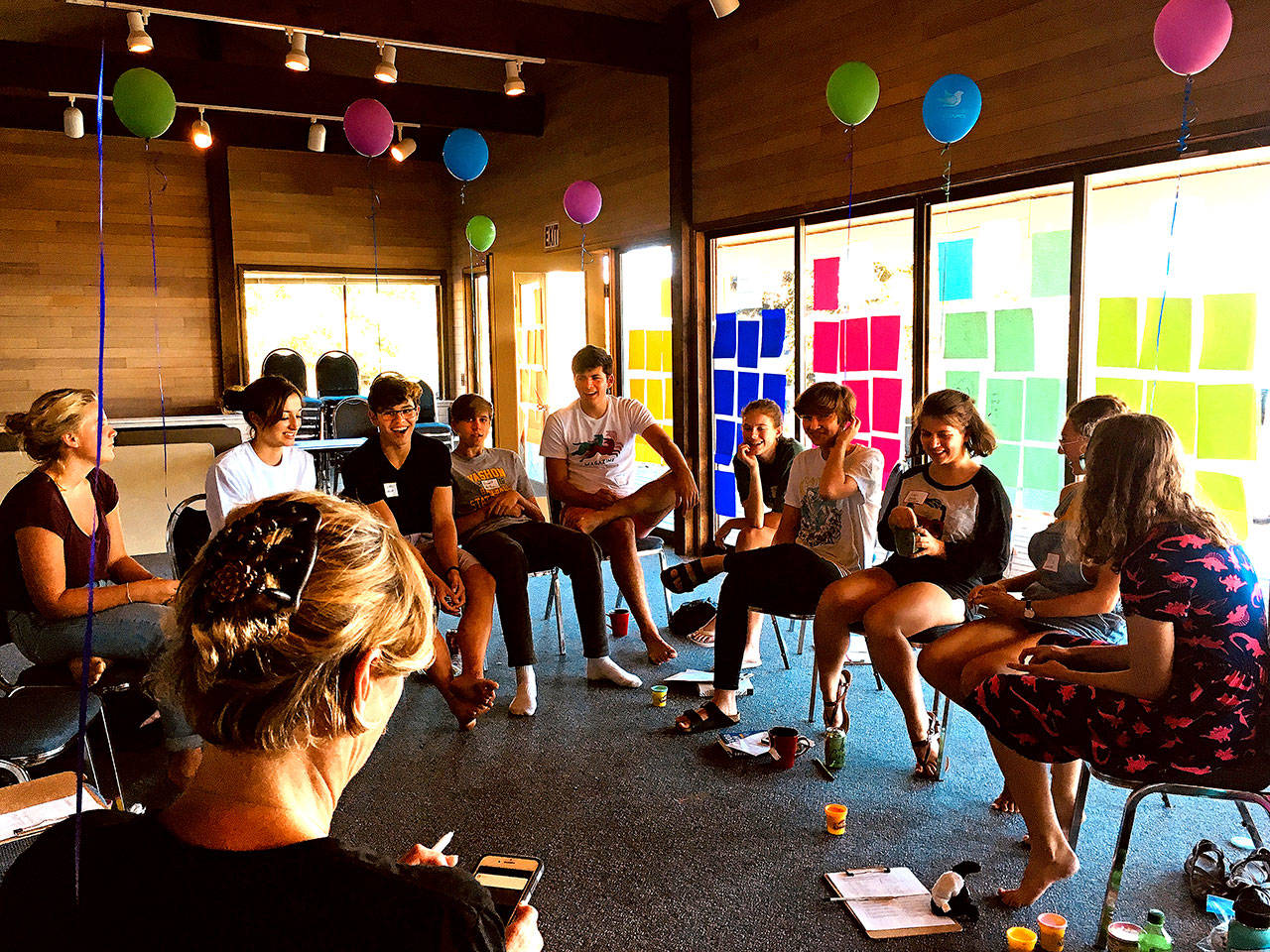By Marie Koltchak
For The Beachcomber
How do you empower adolescents to navigate health, sexuality and relationship issues? On Vashon, you call in the teenagers.
On a recent evening, in a comfortable and informal office space, 10 high school students broke into small groups and took turns citing facts on opioids in front of fellow Vashon Teen Council members. Relaxed and focused, they offered each other feedback as they polished short presentations designed to provide information to their peers quickly and efficiently the following school day.
“We want to de-stigmatize the idea of getting help in an overdose or drug-related emergency. People should know they won’t get in trouble for calling 9-1-1,” said Lucas Schoenberg, a returning council member.
In 2016, Vashon Island’s domestic violence response and awareness organization, The Dignity Opportunity Voice Empowerment Project (DOVE), launched the Vashon Teen Council (VTC), a peer-to-peer education program based on Planned Parenthood’s award-winning, nationally recognized model. VTC receives funding from the King County Department of Community and Human Services Best Start for Kids program.
In an innovative move that increased the amount of time and exposure in the classroom, DOVE and the Vashon Island School District collaborated to incorporate the teen council educational program directly into Vashon’s middle and high school health and sex-ed curriculum.
The program teaches high school students to act as trusted resources and provide accurate information to their peers on the subjects of sexual health and healthy relationships.
Throughout the academic year, VTC members participate in weekly training and receive a total of 100 hours of specialized instruction. They learn the program content, communication and teaching skills. They present regularly to McMurray Middle School and Vashon High School students in health classes, SMART periods and at school assemblies.
The curriculum priority topics include HIV and sexually transmitted infections; birth-control methods; consensual sex; healthy relationships; dating violence awareness and prevention; reproductive anatomy and physiology; postponement of sex and abstinence; substance abuse and mental health and resources for teens.
At the middle school, council members teach full days of classes, assisting teachers with an established health and sex-ed curriculum. DOVE program facilitators and teachers provide mentorship throughout the day.
Classes include anonymous Q&As, where students can ask questions they might find awkward asking family or friends. Council teens lean on their training and disclose when they themselves need more information to answer a question. Because the teens deliver information in an honest, nonthreatening way, they have credibility with their peers.
Research supports that adolescents are more likely to change behaviors and attitudes when they receive health messages from peers who face similar concerns and pressures. Because they share standing in age, background, social status and interests, peers provide a critical sense of context and belonging.
Greg Allison, principal at McMurray Middle School, believes the VTC is working.
“Our students are much more engaged in these discussions and lessons because of the participation of the youth council students,” he said.
At VHS, peer educators teach in the freshman health class. This year, they’ll debut a lesson on mental health in their English class. The new lesson will serve as a resource for students and prevention and support services.
“This lesson is a little different from what we usually do. It’s a great opportunity to teach teens how to seek help,” said Tracy McLaren, DOVE’s Prevention Program Supervisor and VTC co-facilitator.
In an effort to increase teaching hours and broaden the program’s reach in the high school, peer educators also teach mini-lessons. The focused, five-minute talks rotate throughout all the classrooms during the busy school day.
“The folks at DOVE do a great job of training the kids and then moving into a support position and letting them take the lead in the presentations,” said Tara Vanselow, a guidance counselor at Vashon High School. “They talk about sensitive and challenging topics and do so with maturity and grace. I’m always impressed with the work the kids do.”
Teen council members carry full academic loads and participate in various club or sports activities. Some hold part-time jobs and commute from off-island. But while the time commitment is significant, participation in the peer education program has a positive impact on peer educators themselves.
Margot Armstrong, a 17-year-old high school senior, worked as a teaching assistant in a health clinic before joining VTC.
“I noticed when I came to the high school that it was easy to feel lost, and I wanted to help create a safe space for students,” said Armstrong, a first-year council member. “I like making an impact behind-the-scenes – getting people engaged in events and seeing my peers get involved with their own mental health.”
Twenty-five hours of participation on the VTC meets the community service high school graduation requirement. DOVE’s McLaren specifies that only the hours earned in the classroom, assemblies or community events apply towards that requirement.
In addition to learning about relationships and sexual and reproductive health, council members learn social leadership, decision making, collaboration and conflict-resolution skills. They engage in public speaking in the classroom and at community events and school-wide assemblies.
They learn to plan, develop, implement and evaluate content, giving them the opportunity to innovate. They participate in awareness and service campaigns that uphold causes they want to support like LGBTQ rights, domestic-violence awareness and anti-bullying.
Additionally, council members can participate in Planned Parenthood’s Teen Lobby Day, in which youth travel to Olympia lobby for issues surrounding reproductive health and justice.
Marie Koltchak is a volunteer and writer who lives on Vashon-Maury Island and is the parent of a teenager.


